Samsung to unveil industry’s highest-capacity eSSD in November
With the mass production of the BM1743 enterprise SSD, Samsung aims to overtake SK Hynix and its affiliate Solidigm
By Aug 19, 2024 (Gmt+09:00)
Samsung steps up AR race with advanced microdisplay for smart glasses


When in S. Korea, it’s a ritual: Foreigners make stops at CU, GS25, 7-Eleven


Maybe Happy Ending: A robot love story that rewrote Broadway playbook


NPS yet to schedule external manager selection; PE firms’ fundraising woes deepen


US auto parts tariffs take effect; Korea avoids heavy hit


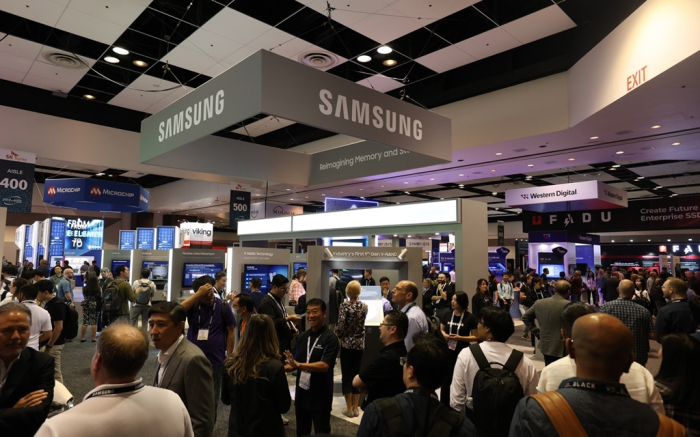
Samsung Electronics Co., the world’s largest memory chipmaker, plans to unveil the industry’s highest-capacity enterprise solid-state drive (eSSD), BM1743, in November to compete with eSSD market leader Solidigm, a US-based NAND flash memory unit of SK Hynix Inc.
At an annual industry meeting of flash memory chipmakers in Santa Clara in California’s Silicon Valley, company executives said the development of the 128 terabyte (TB) eSSD will be completed by November this year.
Once launched, the BM1743 will be the industry’s highest-capacity quadruple-level cell (QLC) SSD.
Samsung already developed 64TB eSSD last month and is ready for mass production.
If successful, Samsung will be launching the industry’s highest-capacity eSSD product ahead of its crosstown rival SK Hynix’s NAND flash memory affiliate Solidigm, which is expected to unveil a 128TB eSSD early next year.
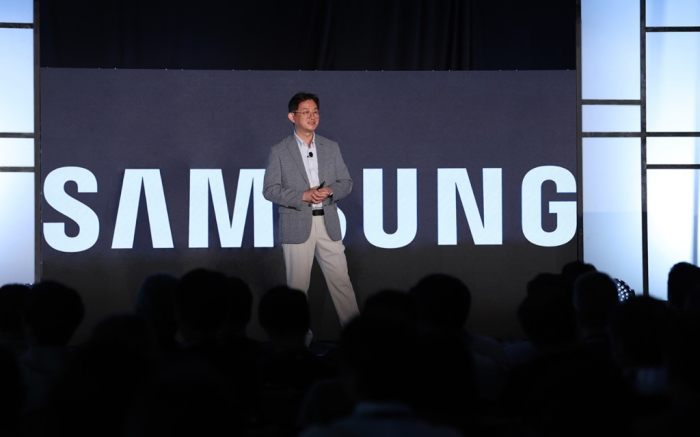
The 128TB product, using a seventh-generation QLC NAND flash, will have a sequential read speed of up to 7.5 gigabytes per second (GB/s) and a write speed of up to 3GB/s – twice as fast as its previous-generation models.
Enterprise SSD, or eSSD, is a data storage device for servers. NAND flash is the main component of an eSSD, which also includes DRAM and a controller. With explosive demand growth for AI chips, eSSD is emerging as a core component of AI chips alongside high-bandwidth memory (HBM) chips.
SAMSUNG AT FMS 2024
Samsung, the memory industry leader at the forefront of the artificial intelligence (AI) revolution, showcased its latest memory and storage products at the annual flash meeting, called the Future of Memory and Storage (FMS) 2024, held earlier this month.
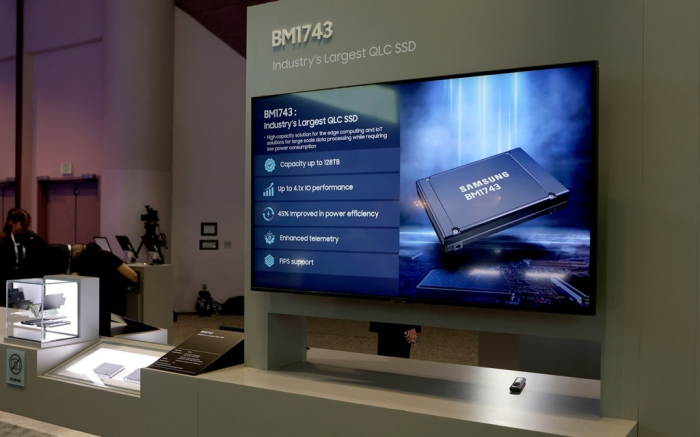
At the FMS meeting, formerly known as the Flash Memory Summit, Samsung said it received the “Most Innovative Memory Technology” award for its BM1743 128GB QLC SSD.
Samsung showcased its eSSD products with capacities ranging from 16TB to 128TB.
At FMS 2024, Samsung also showcased its PM1753 low-power 16-channel SSD, designed to handle heavy write loads and large-scale training data, and V9 triple-level cell (TLC) NAND technology.
SAMSUNG-SK HYNIX RIVALRY
Chipmakers are competitively unveiling new SSDs for individual and corporate uses to grab a greater share of the growing market.
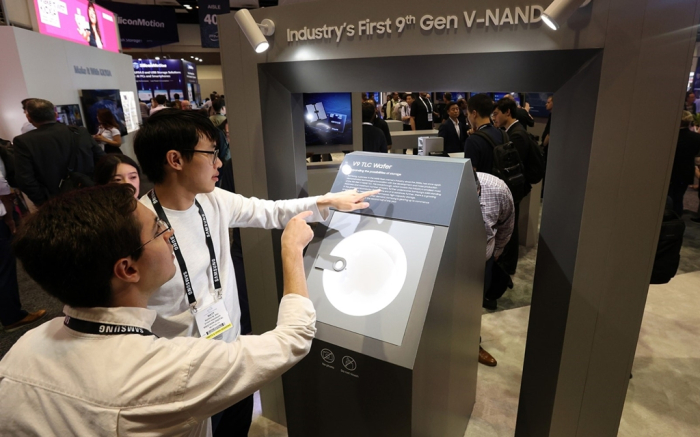
In August 2023, Samsung teamed up with US cloud software provider VMware Inc. to strengthen its SSD competitiveness.
According to market research firm TrendForce, Samsung controlled 41.7% of the global eSSD market as of the fourth quarter of 2023. SK Hynix and its affiliate Solidigm ranked second with their combined market share of 31.2%.
In the QLC-based high-capacity eSSD segment, SK Hynix and Solidigm control the market while Samsung is a fast follower.
SK Hynix, the world’s No. 2 memory maker, has also unveiled a series of new SSDs to expand its presence in the corporate and consumer markets for high-capacity storage devices.
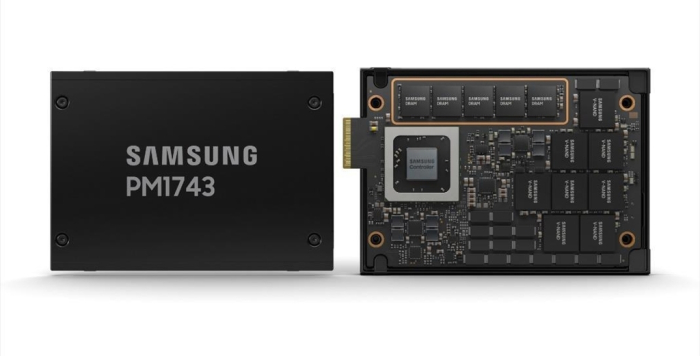
TrendForce data showed the global enterprise SSD market expanded to $3.76 billion in the first quarter, up 63% from $2.31 billion in the fourth quarter of 2023.
QLC-based eSSD shipments, in particular, are forecast to rise fourfold to 30 exabytes (EB) this year from last year.
One EB is equal to one billion gigabytes. An exabyte is large enough for about 250,000 high-end home computers or 1 million average home computers to store this amount of data.
Write to Jeong-Soo Hwang at hjs@hankyung.com
In-Soo Nam edited this article.
-
 EarningsSK Hynix to supply 12-layer HBM3E to Nvidia in Q4; profit soars in Q2
EarningsSK Hynix to supply 12-layer HBM3E to Nvidia in Q4; profit soars in Q2Jul 25, 2024 (Gmt+09:00)
3 Min read -
 Korean chipmakersHBM chip war intensifies as SK Hynix hunts for Samsung talent
Korean chipmakersHBM chip war intensifies as SK Hynix hunts for Samsung talentJul 08, 2024 (Gmt+09:00)
4 Min read -
 Korean chipmakersSamsung launches dedicated HBM, advanced chip packaging teams
Korean chipmakersSamsung launches dedicated HBM, advanced chip packaging teamsJul 05, 2024 (Gmt+09:00)
3 Min read -
 Korean chipmakersSK Hynix develops SSD for AI PCs to be mass-produced this year
Korean chipmakersSK Hynix develops SSD for AI PCs to be mass-produced this yearJun 28, 2024 (Gmt+09:00)
2 Min read -
 Korean chipmakersSamsung’s new 990 EVO SSD ideal for everyday use, more demanding work
Korean chipmakersSamsung’s new 990 EVO SSD ideal for everyday use, more demanding workJan 24, 2024 (Gmt+09:00)
3 Min read -
 Tech, Media & TelecomSamsung’s tie-up with VMware to strengthen SSD competitiveness
Tech, Media & TelecomSamsung’s tie-up with VMware to strengthen SSD competitivenessAug 24, 2023 (Gmt+09:00)
2 Min read -
 Korean chipmakersSK Hynix unveils world's first 238-layer NAND; Samsung SSD 20 times faster
Korean chipmakersSK Hynix unveils world's first 238-layer NAND; Samsung SSD 20 times fasterAug 03, 2022 (Gmt+09:00)
3 Min read -
 Korean chipmakersSamsung’s new 5 nm high-performance SSD faster, uses less power
Korean chipmakersSamsung’s new 5 nm high-performance SSD faster, uses less powerJan 12, 2023 (Gmt+09:00)
2 Min read


